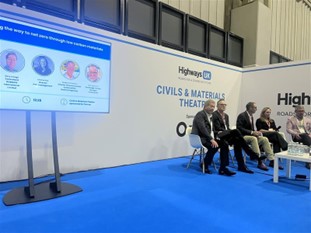Highways UK 2024 brought together over 12,000 attendees to address the issues tackling the UK’s highways. Carbon intensive building materials, budget constraints and inefficient business practices are amongst many of the barriers hindering the progress towards more sustainable roads. From low-carbon materials to digital twins, exhibitors showcased their solutions to drive sustainability, reduce emissions, and help meet the UK’s Net Zero targets.
Sustainable Materials in Construction
For me, the biggest takeaway was the urgent need to change our construction materials. The production of asphalt and tarmac contribute heavily to carbon emissions and while innovative alternatives exist, their adoption is slow.
However, one of the biggest barriers to adoption is a lack of long-term data on the performance of these new materials. Is it truly safe to lay a new material without knowing how it will hold up under traffic over the next 15 years?
To address this, National Highways suggest a blend of laboratory data and shorter-term field assessments, one to two years, to establish standards. This approach aims to balance safety whilst still enabling innovation, allowing us to be proactive rather than waiting decades for long-term data.
A panel around materials and sustainability highlighted three core priorities:
- Safety
- Carbon
- Cost
However, it’s difficult to rank these priorities as everyone has different views. Though new materials can be deemed unsafe, one panellist argued that in fact our current roads are unsafe as they were not designed for today’s realities, such as increased traffic, rising temperatures, and different vehicle types. New materials will increase safety and from there, carbon will ultimately drive price because of government levers. National Highways is clearly making significant efforts to trial new materials; however, this initiative also needs to be adopted at the local level too.

Gaining the buy-in of local governments can be difficult as they often tend to prioritise budget constraints over experimental solutions. Many are hesitant to trial new materials without clear evidence of cost savings and durability. The key to addressing this is education… exhibitors expressed their view that their solutions are often the same price as traditional materials, some even come with significant cost savings, however they usually lack awareness at a local level. By 2025, all highways will be required to have PAS 2080 certification, a standard that promotes sustainable practices in managing infrastructure carbon. Hopefully, the certification will encourage local authorities to trial innovative materials and methods to meet these targets.
Amongst many, Low Carbon Materials exhibited their solution ACLA®, a carbon-negative aggregate that helps make asphalt net-zero, providing a solution for greener UK roads. Tested with National Highways and Skanska, ACLA® captures carbon and fits easily into current asphalt production.
Technologies driving digital transformation
From carbon emission calculating to AI-powered roadside cameras, technology is transforming all aspects of highway operations.
RICS Tech Partner, Bluebeam delivered a presentation showcasing how the US is leveraging technology to enhance its highways. Like the UK, the US is dealing with aging infrastructure and increased traffic. The aim of the presentation was sharing effective strategies that could be adopted in the UK to improve highway management and safety.
One example shown was the “Drone-in-a-Box" system that is being implemented in remote areas for automated roadside assessments. This technology allows for rapid data collection and response in emergency situations. By strategically positioning these stations, authorities can use the aerial imagery to assess accident scenes whilst also analysing key information like traffic patterns - all with little human intervention. This system enables first responders to make informed decisions more quickly, improving safety and efficency.
Another example was the I-35W Saint Anthony Falls Bridge in Minnesota, which uses IoT technology to monitor its structural integrity. The bridge is equipped with embedded sensors that continuously monitor metrics like stress, vibration, and temperature. This real-time data allows for immediate health assessments and proactive maintenance, ensuring the bridge remains safe for public use. The use of IoT systems ensures that the bridge not only extends its lifespan but also minimises the risk of unexpected failures.


For monitoring critical infrastructure, connectivity is key. Onwave, an RICS Tech Partner, showcased their connectivity solutions, the use of IoT devices and their integration with highway projects.
IoT has many use cases, for example sensors can monitor road conditions and traffic flow, providing real-time journey information, whether through mobile apps or electronic signage. Additionally, vehicle corridors can wirelessly connect infrastructure to user vehicles, delivering congestion alerts or road closure notifications.
Beyond highways their solutions can also be used in construction to enhance safety by monitoring site conditions, vehicles, and staff members. This connectivity ensures that everyone involved has access to important information, ultimately aiding decision-making, improving safety, and enhancing project efficiency.

Achieving true sustainability
Sustainability can often be a term that is misunderstood. What do we really mean by ‘sustainability’, especially within in construction? While reducing emissions is an important aspect of sustainability, being truly sustainable in construction encompasses much more.
To effectively reduce emissions, we must understand everything that goes into and out of a project. In a panel discussion, Highways UK emphasised the importance of whole-life carbon data. We need to consider every phase of a material’s lifecycle—from raw material extraction and transportation to installation, maintenance, and eventual disposal. But how do we collect this data?
Qualis Flow, an RICS Tech Partner, exhibited their solution at the event. Their software, Qflow, provides real-time data to help monitor and reduce carbon emissions, supporting efforts to minimise environmental impact. Contractors can gather their supply chain data by allowing teams to capture goods received notes (GRNs) and waste transfer notes (WTNs) digitally. This is done through click of a button, by taking a photograph taken at the gate of the site. By streamlining this process, Qflow not only enhances data accuracy but also reduces the time spent on administrative tasks.

However, sustainability doesn’t stop there. Sustainable practices involve making long-term improvements in areas like resource efficiency, safety, and cost-effectiveness. Ultimately, t’s about predicting and planning so that workflows can be optimised, ensuring projects run efficiently without unnecessary waste.
RICS Tech Partner, ALICE Technologies, also exhibited their solution at the event. Their software supports this broader definition of sustainability by allowing teams to model various project constraints, optimise resources, and balance factors like traffic disruption and cost against the drive for lower emissions. Together, these tools contribute to achieving true sustainability in the industry.
Looking to the future
Highways UK 2024 didn’t shy away from addressing the current challenges but emphasised the urgent need for change. It highlighted three key priorities: safety, carbon reduction, and cost, that must be considered as we move forward. The innovations exhibited hold the potential to reshape our infrastructure for a more sustainable future. Looking forward, these advancements, if widely adopted, could be the foundation futureproofing the UK road system. The challenge is to turn these concepts into long-lasting change and build infrastructure that satisfies both present and future needs.














